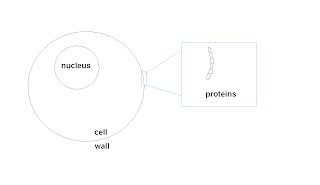 I wish I could do origami. I admire people who have the designing skill in folding sheets of paper to form creative representations of animals, machines, all kinds of stuff. One form of origami that most people can do to some degree is to fold paper airplanes. If done right, paper airplanes not only have the look of design; they also have a designed function. They can fly. Some better than others.
I wish I could do origami. I admire people who have the designing skill in folding sheets of paper to form creative representations of animals, machines, all kinds of stuff. One form of origami that most people can do to some degree is to fold paper airplanes. If done right, paper airplanes not only have the look of design; they also have a designed function. They can fly. Some better than others.Your body is full of a gazillion little works of origami. These are protein molecules. They are formed by smaller molecules that continually cooperate to form amazingly complex things in your body. Systems that make your proteins are targeted in elegant ways that systems of chance and random mutation could care less about.
Think of proteins as basic tiny structures of life. Many proteins make up the fundamental little stuff that, when shaped just right, is packed together to form the relatively larger (yet still very small) parts that you're probably more familiar with--namely, your body's cells. Now you might be thinking that DNA is the smallest, most basic stuff of life. Well, while DNA is certainly made up of physical stuff in the way of very importantly arranged molecules (nucleotides), it is probably better to think of it as the source of information, or the special "code," that "informs" other tiny molecules (amino acids) how to come together in very precise ways to form exquisite chains that will be rolled up, or folded, to form proteins. Think about this. If these tiny proteins, not to mention the tinier amino acid molecules from which they are constructed, were not shaped and sized to precision, they would be useless. They could not be used as the building blocks for constructing healthy cells that make up your body and maintain important systems that keep you alive from moment to moment.
The processes that do this precise folding to form just the right kinds of proteins that form your cells are, of course, pretty complex. Did you know that there are certain kinds of proteins whose job is actually to assist in this amazing biological work? They are called chaperone proteins for an obvious reason; they chaperone the chains that make other proteins so that no "improprieties" take place while folding. I didn't like being stuck with a chaperone when I was dating someone as a teenager, but now I've got to admit that it served a useful purpose for society. My date and I could have really ruined our relationship and caused big problems for the broader society involved--our families, schools, communities, etc.--had we not been properly chaperoned sometimes. That meddlesome person stuck in your youth group trips or dance parties was also necessary "to ensure propriety or restrict activity" (wink-wink). In a similar way, there are specially assigned chaperones in your body that are made to "run interference" and ensure that the folding and forming of proteins are done without any "risky business" during the process. They help keep the process running smoothly and free from "impurities" that try to sneak in.
Instead of origami, let's now compare this to properly setting up a large camping tent. After the canvass of a really large tent is rolled out and prepared for setting up, it usually takes two people to work on it, perhaps more, depending on how big and complex the tent is. The complexities of propping up the canvass, running the right poles through the right holes, placing the poles in the ground, driving stakes that keep the tent spread out and shaped correctly, etc., all require cooperation from the campers working on it. They have to work together, carefully in tandem, as one works on his side of the tent and pauses to wait patiently for the other person or persons to catch up on their sides. Most camping tents don't just roll themselves out and shape themselves. (Popup "campers" don't count. Everyone knows that sleeping in those things isn't real camping!) This takes intentional work through a planned out process of multiple workers. Just as these tents don't just set up themselves, neither do the essential proteins that make up the stuff of your body and the busy "factory work" that continually happens to keep your cells and organs functioning and your body alive.
So now you can thank the origami artist for amazing you with his or her creative talent, and thank your camping buddy who has helped you set up a nice tent. It would be wierd to thank chaperone proteins for just mindlessly doing their jobs. It would be completely natural to thank the intelligent designer who made chaperone proteins and keeps them working hard every second of your life.
As for the people who chaperoned me on my first dates as a teenager--maybe I'll thank them later.

